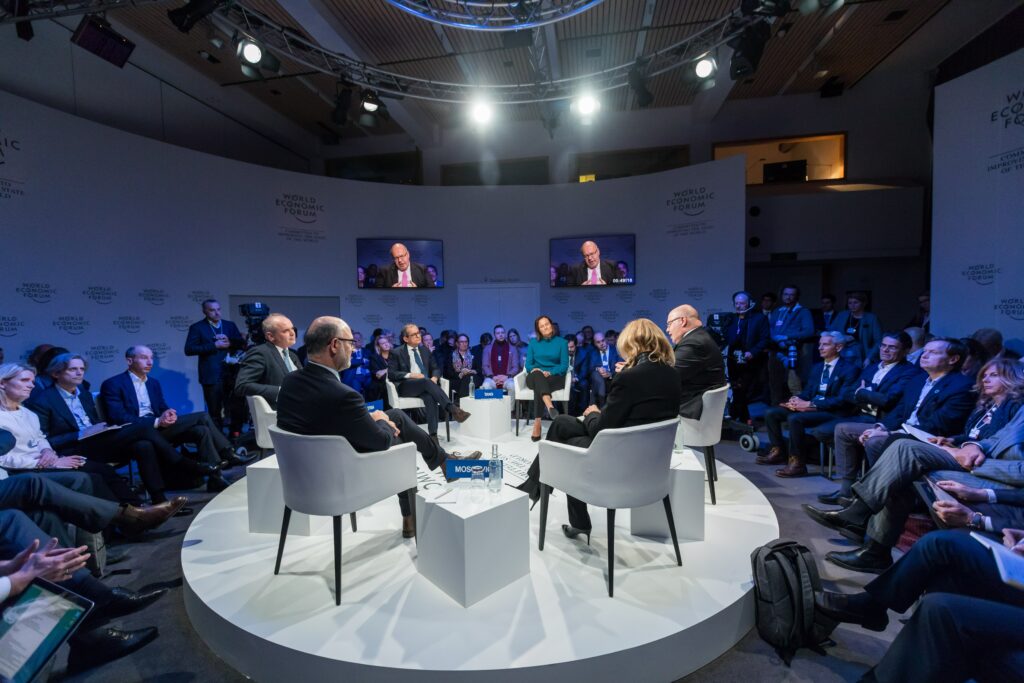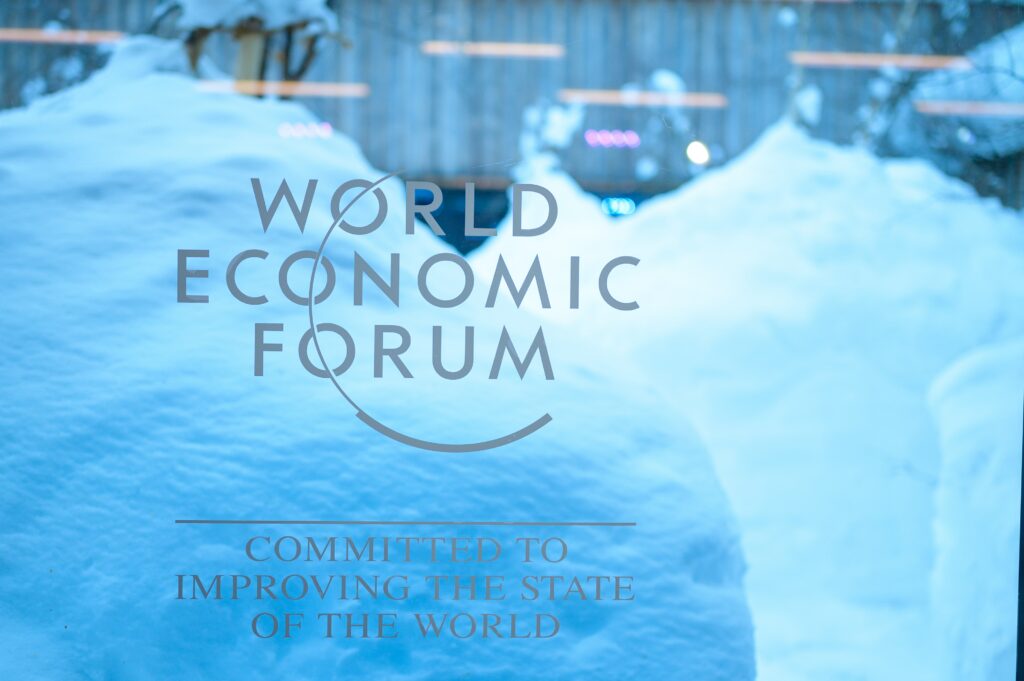Do., Jan. 19th 2023

WEF’s annual meeting in Davos is televised, but insiders say most of the action happens when the cameras are turned off.
For one week each January a small, mountain village in Switzerland is transformed into a playground for the world’s elite to tout the benefits of globalization while rubbing elbows with celebrities. And while the World Economic Forum’s (WEF) annual meeting in Davos used to draw many heads of state, this year’s meeting is notably more billionaires than presidents – which has only added fuel to the criticisms that the attendees are out of touch with the world.

This year’s meeting began on January 16 and ends on the 20th.
Against the backdrop of war, skyrocketing inflation and the still hot embers of a global pandemic, this year’s WEF conference feels decidedly different. For one thing, global leaders are scarce – too wary of what may be thought of them for fraternizing with billionaires while their citizens struggle to pay electricity bills. The only G7 leader present is German Chancellor Olaf Scholz.
Among some 400 government policymakers and 600 CEOs attending the 2023 forum are EU President Ursula von der Leyen, UN chief Antonio Guterres, UK actor Idris Elba, and first lady of Ukraine Olena Zelenska. Her husband, Ukrainian President Volodymyr Zelenskyy, made an appearance by video Wednesday night.
It was not that long ago in 2021 when Russian President Vladmir Putin was the one who dialed into WEF to address delegates. In 2013 Russian Prime Minister Dmitry Medvedev was hailed as an honored guest who understood “global responsibilities.” In years past it was well known that the wealthy Russian oligarchs were the ones who threw the most extravagant Davos after-parties. But of course, Putin, Medvedev and those oligarchs are not present at this year’s meeting.
Even without the Russians, there are roughly 116 billionaires registered to attend this year’s event according to Bloomberg. That is an increase of about 40% since 2013.
The theme of 2023’s meeting is “Co-Operation in a Fragmented World.” Some news pundits say that 2023 is already the “end to the era of globalization” – an unraveling that began decades ago, despite 50 years of Davos meetings. In fact, it was in 2019 when ZEIT magazine editor Anand Giridharadas described Davos as “a family reunion for the people who broke the modern world.”
Some attendees the public may not be aware of are escorts, according to Swiss media.
Sex workers have been in high demand among Davos participants, according to a report released this week by Swiss news outlet 20 Minuten. (For the record, sex work has been legal in Switzerland since the 1940s). According to a 2020 report by the UK’s The Times, at least 100 sex workers travel to Davos around the time of the conference. “Sex workers ply their trade in delegates’ hotels and in bars along the town’s promenade while sexism and sexual harassment are rife,” according to that report. It features several examples of senior male businessmen engaging in sexual harassment at Davos.
“WEF is the worst because they’re among their privileged friends. Actually it’s safer here for them to be inappropriate than anywhere else in the world. That’s the reality,” one woman told the outlet.

For most of the year, the town of Davos is a relatively quiet ski resort. Residents often rent out their apartments and homes to WEF attendees, while they leave for that week.
Always a topic of discussion at Davos: global warming and what can be done to slow it down. But while WEF does not have much to show for 50 years of discussing the topic, their private jets flying to and from the event have been racking up enough carbon emissions to equal a small country.
Environmental group Greenpeace has been protesting the hypocrisy of the event for days, SWI reports. The number of private jet flights serving Davos has doubled during last year’s meeting – about 1,040 private jet flights, according to Dutch consulting firm CE Delft and Greenpeace. In less than one week, WEF’s 2022 conference contributed 9,700 tons of CO2 emissions, which is equal to about what 350,000 cars produce in a week.
“The rich and powerful flock to Davos in ultra-polluting, socially inequitable private jets to discuss climate and inequality behind closed doors,” said Greenpeace in a Presseerklärung.
“Given 80% of the world’s population has never even flown but suffers from the consequences of climate-damaging aviation emissions, and that the WEF claims to be committed to the Paris Climate agreement, this annual private jet bonanza is a distasteful masterclass in hypocrisy,” writes Greenpeace. The global elite must set a good example and ban private jets and “useless short-haul flights,” it demanded.
In response, WEF employees told Swiss newspaper Tages-Anzeiger that it offsets the CO2 emissions by supporting environmental projects through the Swiss firm South Pole. Greenpeace argues that such “carbon offsets are a scam."

The creator of the meeting, Klaus Schwab, has as many fans as he does critics. He has named no successor to his position, although he is now in his 80s.
Perhaps the most controversial element of the Davos conference is the man at the helm, the founder, creator, and executor of the annual meeting: Klaus Schwab. The 82-year-old German engineer, often referred to as “Mr. Davos,” is not fit to run the organization, according to an alleged group of anonymous WEF employees who contacted The Guardian.
“We are a group of current and former employees of the WEF. We want to play our role in fostering debate about the role this organization plays in the world,” the group said in a post originally put on social media sites (the posts were taken down). “We are hesitant to come forward as Klaus is very well connected and can make life very difficult for us even after we leave the WEF,” they said in a message to the newspaper.
According to those staff members, Schwab surrounds himself with “nobodies.”
“There isn’t much of a future for the WEF beyond Klaus not just because there isn’t a clear successor but also because his managing board is such a viper’s nest that senior leadership will be at each other’s throats the moment the old man pops off,” they said.
“Klaus picks his leaders using the same criteria Putin uses to pick deputies for the state duma: loyalty, guile, sex appeal. The quality of people at the top is reflective of the type of people who work for the rest of the organization,” the employees said.
The groups that bankrolls the $390 million a year that is required to keep WEF running are also leery of this fact, according to a Politico article. WEF is considered a foundation and, therefore, does not have to answer to shareholders, according to Schwab.
The lawlessness surrounding WEF and Schwab appears to be what troubles the alleged group of WEF employees the most. Schwab promotes a concept called “stakeholder capitalism” – which is at the cornerstone of WEF’s 2020 Great Reset plan.
The theory (whose roots can be traced as far back as to ancient Greek philosopher Plato) promoted under this plan is that corporations should no longer focus on pleasing shareholders, but society at large by creating value for employees, customers, suppliers, and other “stakeholders.” Schwab believes that this could be achieved through “multi-stakeholder partnerships” in governments, the private sector and civil society. And while that may sound idealistic, some economists are quick to point out that this means giving corporations more power over society.
And who would gain power in this scenario? It is impossible to know what Schwab imagines, but to illustrate, some of WEF’s largest partners include Google, Facebook, Amazon, Pfizer, Moderna, Coca-Cola, and Nestlé, as well as the biggest names in oil like Shell, Chevron, BP and Saudi Aramco.
WEF’s annual meeting in Davos ends tomorrow. Stay tuned for more.
Dieser Artikel darf frei weitergegeben und nachgedruckt werden, vorausgesetzt, es wird auf den Originalartikel verwiesen.
